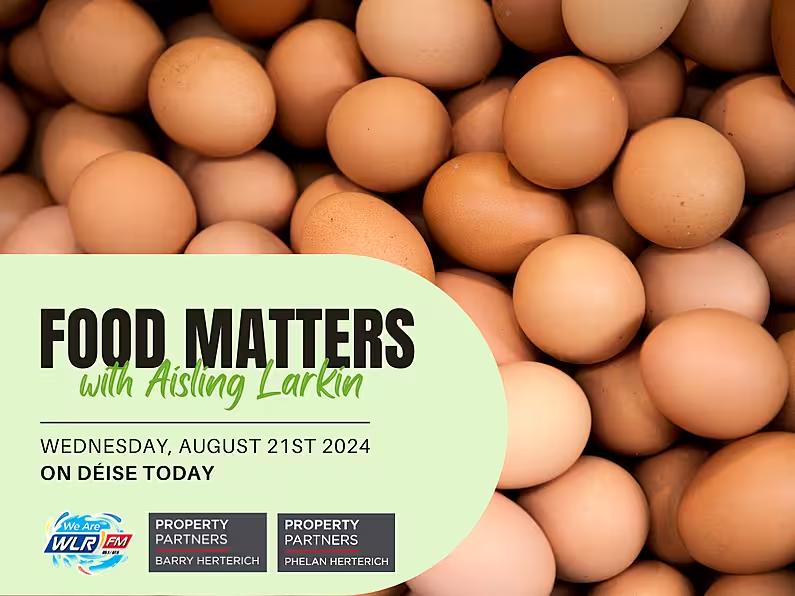In Episode 16 of Food Matters well-renowned Chef, TV Cook, and Food Media Broadcaster Aisling Larkin chats about having eggs for breakfast.
Food Matters is brought to you with thanks from Property Partners Barry Herterich and Property Partners Phelan Herterich who have offices in Tramore and Waterford City. With over 40 years combined experience both Barry and Deirdre bring a wealth of knowledge and experience in residential and commercial property, and we pride ourselves on our exceptional service, results-driven dedication, and our reputation for trustworthy, focused commitment to every client. With an emphasis on communication and integrity, we deliver expertise and success to all of our clients, presenting a bespoke service that always goes the extra mile.
Waterford City - Property Partners Phelan Herterich website HERE / Call 051-364052 / Connect on Facebook HERE
Tramore - Property Partners Barry Herterich website HERE / Call 051-330465 / Connect On Facebook HERE
Why?
- Fullness & Satiety - there is a difference - both important - Physical & Emotional / Mental satiety
- Nutritional aspect - reduce/prevent the glucose spike. Protein keeps you fuller for longer. Macronutrients - Vit E, fat-soluble vitamins. Protein 63g large egg 7g protein
- So handy - great shelf life, quick, easy, versatile, super economical
Nutritional Benefit of Eggs
A high-protein breakfast can help you jumpstart your metabolism. Eggs are also one of the few natural sources of a vital nutrient choline.
Choline is found in egg yolks and is very important in maintaining a healthy metabolism. It also supports brain health, nerve functions and energy levels.
Eating eggs for breakfast helps you feel full for a longer time.
High protein foods are also known to reduce appetite meaning that you are less likely to binge eat between meals. It will make the weight loss journey easier and you will consume fewer calories during the day.
Eggs are a high-protein food. Eating whole eggs for breakfast after your morning run or a session at the gym helps you build more lean muscle than eating egg whites. Consuming eggs after a workout session gives the body the much-required protein for the protein synthesis process and builds lean muscles. Eggs protein is also one of the best proteins for muscle strength and tissue repair.
Egg yolks are a very good source of Vitamin D, an essential nutrient for bone health and immunity. Vitamin D deficiency is also linked to increased fat buildup in muscles and belly.
Satiety
A feeling of fullness and satisfaction from food.
A bowl of high-sugar cereal might give you an instant hit of sugar and energy - you will be “seeking” /. Craving within 90 minutes.
We need to leave the table after breakfast and not want to eat for at least 4 hours.
The 11 o’clock tea break is more of a seeking of mental stimulation instead of physical hunger in lots of cases.
Some foods provide much higher levels of satiety than others - instant gratification versus delayed and sustained contentment
Don’t forget in all of this sensory regulation is a big part … some foods will pride much more on sensory regulation than others at the moment depending on our sensory preferences for sensory stimulation or sensory calming
For a food to offer satiety, it must be satiating it must be satisfying from a sensory perspective, it must be full of flavour, it must be interesting to eat for our brain to remember that we ate it….
Blood Sugar / Glucose levels
Blood sugar levels rise and fall after every meal or snack we eat that contains carbohydrates. Our body breaks down these carbohydrates into simple sugar molecules, including glucose. Glucose is absorbed by the gut into our bloodstream, which results in increased blood sugar levels.
When this happens, our bodies should be able to handle it in such a way that blood sugar levels don’t end up being either too high or low.
Insulin is one of the main hormones involved in maintaining healthy blood sugar levels. It is secreted by the pancreas in response to elevated blood sugar levels and helps to facilitate the movement of glucose from the bloodstream into cells to be used for energy and storage (it acts like a key that ‘unlocks’ the door to your body’s cells).
Egg Options for Breakfast
- Boilied, hard-boiled, jammy
- Scrambled/folded / power scramble
- Omelette
- Poached
- Fried
- Egg frittata
- Quiche
- Egg muffins
- Baked eggs
- Shakshuka
Recipe Ideas
Breakfast Rotation Meal Planner
Oats
Egg
Fruit/veg + protein
Oats
Eggs
Fruit/Veg + Protein
Oats - overnight oats, greek yogurt, vanilla, honey, berries, a dollop of nut butter
Egg - Breakfast Burrito
Fruit/veg - kefir berry smoothie with spinach, coconut water, a dollop of but butter, greek yogurt
Oats - porridge/granola
Eggs - wholewheat English breakfast muffin, scramble, sausage Pattie, relish, rocket
Fruit/Veg - frittata
Oats - granola
Eggs - jammy eggs with whipped herby ricotta, sun-blushed tomatoes, spinach, toasted multi-grain sourdough
Breakfast Nachos
Salsa - Granstown tomatoes
Blanco Nino Nachos
Power Scramble
Avocado
Jalapeno
Cheddar
Breakfast Frittata
Folded Eggs - another way to create scrambled eggs.
Folded eggs are a creamy omelette/scramble hybrid; the technique results in super-soft, rippled eggs that hold their shape even though they are only lightly cooked
How to
- 4 large organic eggs
- 6 tbsp cream
- 1 tbsp butter
- Salt to taste
Method
- Heat a non-stick frying pan on medium-low heat.
- Crack the eggs into a bowl with the cream and a pinch of sea salt. Whisk until fully incorporated.
- Melt the butter in the frying pan until bubbling and add the egg and cream mixture.
- Allow the egg mixture to sit for around 30 seconds before beginning to gently move the eggs around the pan, slightly folding them over one another.
- When the eggs are almost cooked, remove them from the pan. They will continue to cook with their residual heat. Serve with toast.














